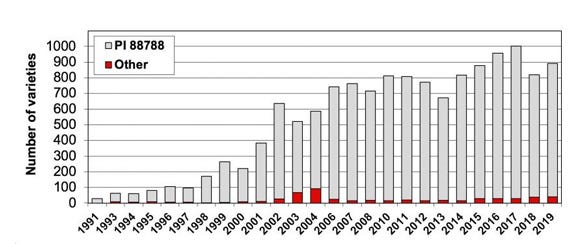December 16, 2019

In last month’s column, we discussed ways to fine-tune your soybean seed selection for 2020 planting. One of the steps mentioned was matching soybean agronomic traits to your particular soils and production systems. One of these traits, a very important one, is variety resistance to soybean cyst nematode. SCN is found in about 75% of Iowa soybean fields.
Resistant varieties continue to be a key tool for managing SCN. With financial support from the soybean checkoff through the Iowa Soybean Association, Iowa State University annually compiles a list of SCN-resistant soybean varieties available for use in Iowa. Greg Tylka, professor in the department of plant pathology and microbiology at ISU, has years of experience as ISU’s Extension nematologist. He emphasizes the role variety choice plays in managing SCN.
The updated list of maturity group 0, I, II and III varieties is now available for free online in the ISU Extension Store. The 2019 list has information on 891 varieties, 71 more than were in the 2018 list. Varieties in the 2019 list are offered by 24 companies and ISU.

RESISTANCE: Number of SCN-resistant soybean varieties in maturity groups 0, I, II and III for Iowa farmers — 1991 to 2019. The gray portion of each bar represents varieties with resistance from PI 88788; the red portion of each bar represents varieties with resistance from sources other than PI 88788 (primarily Peking).

A majority of the varieties in the updated 2019 list possess SCN resistance provided by the PI 88788 breeding line. This has been the situation for many years. Unfortunately, many SCN populations throughout Iowa and other Midwest states have developed increased reproduction on PI 88788 resistance. Consequently, SCN-resistant soybean varieties that have resistance from the PI 88788 trait are not as effective at managing SCN as they were 20 to 25 years ago.
In the 2019 list, 850 (95%) of the varieties have resistance from PI 88788. There are 41 varieties with resistance other than from PI 88788, and 38 of those varieties have resistance from the Peking breeding line. Varieties with Peking SCN resistance are available from 14 seed companies (see table below) as well as from ISU.

Planning for 2020
Management of SCN starts by testing fields to know where the nematode is present and to assess its population densities (numbers), followed by growing nonhost crops and soybean varieties with different sources of SCN resistance, and finally using seed treatments in an integrated approach. The ISU Plant and Insect Diagnostic Clinic processes soil samples for SCN, as do numerous private soil-testing laboratories. Check out a recent ICM News article about fall soil sampling for SCN.
Like all disease or pest resistance traits in crop varieties, SCN-resistant soybeans have their limitations. With over 95% of SCN-resistant varieties sharing the same source of resistance (PI 8878), there are yield consequences. Repeated use of the same control trait spurs an increase in the percent of the nematode population that develops resistance to the resistance. Over a period of years, continuous planting of soybeans with the PI88788 resistance trait has caused SCN to become resistant to SCN-resistant bean varieties.
Tylka’s research shows that SCN populations can increase in aggressiveness with repeated planting of SCN-resistant soybeans that have the PI8878 trait. Farmers planting PI88788 soybeans are selecting for resistant nematodes and are losing yield despite the fact they are planting SCN-resistant beans.
This is where Peking-based resistance in soybean varieties can play a role. Soybeans with the Peking resistance source enable farmers to diversify SCN-resistance sources.
So far, Peking resistance has not been associated with causing lower soybean yields. Some of the top-yielding varieties have the Peking SCN resistance trait. Another bonus of using the Peking resistance trait in soybeans planted in a field is that it can lower nematode numbers, thus reducing the likelihood of future SCN infestations in the field.
Looking to future
Efforts are underway to develop new and unique options for SCN resistance, Tylka says. Transgenic approaches to SCN resistance are being developed by the industry. Also, university soybean breeders have developed soybean lines with unique and stacked combinations of SCN resistance genes from different sources.
These soybean lines are now being grown in different sequences in field studies in Illinois, Iowa and Missouri, funded by the North Central Soybean Research Program. The goal of these studies is to determine how best to deploy the new resistance lines to maximize their durability by minimizing buildup of SCN populations on the new lines.
Learn more about SCN
The SCN Coalition is a national, coordinated effort involving universities, private industry partners, and national, regional and state soybean checkoff organizations working to help soybean farmers and their advisers manage SCN. The SCN Coalition also has Canadian university and private industry partners.
For more information about the project and its wide range of information and resources, go to theSCNcoalition.com. Also, research results and other information about the biology and management of SCN can be found online at soybeancyst.info and at soybeanresearchinfo.com.
McGrath is the on-farm research and Extension coordinator for the Iowa Soybean Research Center at ISU. Contact him at [email protected].
About the Author(s)
You May Also Like






